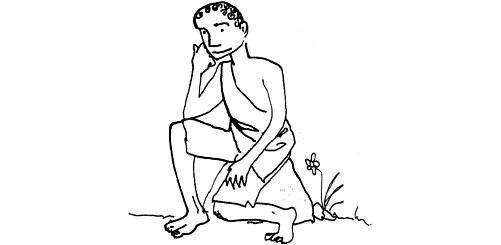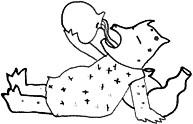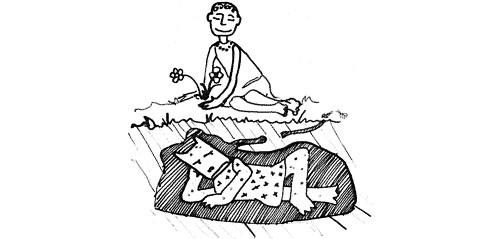
How A Strange
Creature
Took The Place Of
A
Girl And Then Fell
Into
A Hole
The daughter of the chief of some people near Kezi was one of the most beautiful girls in the whole of Matabeleland. The chief knew that there would be no difficulty in getting a good husband for her, but he did not want to leave anything to chance. Calling on a powerful witchdoctor, he asked him to provide charms that would be sure to attract a handsome man to the house.
The witchdoctor told the chief that this was not a difficult thing to do. The best way of attracting a handsome husband was to find a special tree, part of which would have been burned. From the burned part the girl should take a piece of charcoal and then rub this between her palms. If she did this, there would be no difficulty in finding the best possible husband.
The chief was pleased with this advice. He ordered his men to prepare food and water for a journey and then he set off with his daughter in the direction indicated by the witchdoctor.

It was harder than he had imagined to find the special tree but eventually they came to a valley where the conditions seemed right for the growth of such a tree. The chief climbed up to the top of a small hill at the entrance to this valley and looked down onto the place where he thought the tree might grow. When he saw it was there, he called out to his daughter and together they walked to the foot of the half-burned, half-green tree. Climbing up into the branches of the burned part, the chief broke off a piece of charcoal and brought it down to his daughter. She rubbed the charcoal between her palms and as she did so she described the sort of husband for whom she longed.
The girl’s mother was waiting for them when they arrived home.
“A very handsome young man has arrived,” she told them eagerly. “He said that he had lost his way and needed to be given directions to get to the Limpopo River.”
“It is my husband!” the girl shouted out gleefully. “Please show him to me immediately!”
They took the girl to where the young man was sitting on a small rock and showed him to her. She was very pleased to see how handsome and strong he was and the father lost no time in telling the young man that he should marry his daughter. The young man said that he was happy to do this, but that he had no house of his own.

“That does not matter,” said the chief. “I shall give you some poles and some thatch and you can go and build it.”
The young man asked whether it would be possible for him to build his house near the house of his own father, who lived by the Limpopo River. This was some distance away, but the chief agreed that this would be quite all right, as the father of the young man was a well-known chief in that part and he would be able to protect the girl from some of the dangers that were in the Limpopo River and nearby.
The chief spent a day discussing the house and the marriage with the young man and then sent him on his way.

“Begin the building of the house,” he said to him. “In a month I shall send my daughter down to join you at your father’s house. Then you can get married.”
It was difficult for the girl to pass the time without thinking constantly of the husband who awaited her. Toward the end of the month, her mother became ill, and she spent much of her time at her bedside, nursing her and encouraging her to get better. The old woman, however, became weaker and weaker, although she was still able to tell her daughter how happy she was that she would soon be joining her new husband. At last the month had passed and the daughter was told that she could prepare herself for the journey. The chief fetched an ox for her to ride upon, and then he stood at the gate to bid her farewell. As she rode past him, he gave her a small flower.

“Watch this flower,” he said to her. “If the flower wilts, then you will know that your mother has died.”
The girl began her journey, wondering if she would ever see her mother again. By midday, she was halfway there and paused to shelter for a while under the shade of a thorn tree. It was while she sat there that the flower, which she had been grasping in her hand, suddenly withered. At this, the girl knew that her mother had died and she began to weep.

It was important to that girl that her tears should not touch the ground. As the daughter of a chief, this would have been wrong, and so she quickly sought a place where she could weep in safety. Near the thorn tree was a deep ant-hole, and the girl sat next to this, allowing her tears to disappear into the dark depths of the earth. Unknown to her, a strange animal lived in that hole, and he soon felt the warm tears falling upon his skin.
At first the girl was frightened when the strange animal came out of the hole, but when he spoke to her and reassured her she was no longer afraid. He asked her where she was going and why she was going there, and when she explained to him he quickly suggested that it would be better if he accompanied her on her journey. The girl was pleased to have company, and so she agreed that the strange animal could come with her, at least as far as the hills near her future father-in-law’s house.

While the girl rode comfortably on the ox, the strange animal loped along beside her.
“Your clothes are very beautiful,” he said to her. “I wish that I had clothes like that.”
The girl felt sorry for the strange-looking animal and offered to allow him to try on her clothes for a short period. He was very pleased with this offer and was soon dressed in the girl’s clothes, smiling to himself in his satisfaction. After they had covered a short distance, he looked up at the girl and asked her if she was comfortable on the ox.

“It is very comfortable,” the girl said. “It is much easier than walking.”
The strange animal looked sad.
“I have never ridden an ox,” he said. “I shall never know what it is like.”
Hearing this remark, the girl leapt off the ox and told the strange animal that he should take her place.
“This is very kind of you,” said the strange animal, smiling as he climbed onto the back of the ox. From where he sat, he could see the cattle pens of the father-in-law’s village and he knew that they would soon be there.
The father-in-law was at the outer fence, ready to meet his new daughter-in-law. As the ox stopped in front of the village, the father-in-law stepped forward to help the strange animal get off the ox. He frowned as he did so, wondering to himself why his son had said that his new bride was so beautiful when in reality she was so ugly. Perhaps she will seem more beautiful tomorrow, he said to himself.

The real girl tried to tell her father-in-law that the strange animal was only a strange animal dressed in her clothes, but he refused to listen to her, thinking that she was only a servant girl. Telling her to keep quiet, he took the two of them to a hut he had prepared and there they were told to sleep.

The girl soon cried herself to sleep, but the strange animal nosed about the hut looking for things to eat. When he came across the calabashes of sour milk which the family kept in that hut, he drank them greedily, making a loud noise as he did so.
The next morning the family was surprised to find that their sour milk had all disappeared, but everybody thought that the calabashes must have leaked. New calabashes were obtained and these were filled with sour milk and put in the same place as the old ones. That night the strange animal again nosed about the dark corners of the hut and drank all the sour milk, turning the calabashes upside down to empty out the last drop.
The father was suspicious when he found that all the sour milk had once again disappeared and so he called everybody into the meeting area in front of his hut and told them of a plan he had.

“We have a sour milk thief among us,” he said gravely. “There is only one way to find out who it is.”
In the middle of the village a deep hole was dug. Into the hole four calabashes of sour milk were placed and then everybody was ordered to stand in a line. One by one, the people of the village and the visitors too were forced to jump over the hole. Most landed safely on the other side and were told to stand to one side.

When it came to the turn of the strange animal to jump, he had almost reached the other side before he tumbled down into the hole. When the people looked down to see what was happening, they saw the strange animal drinking greedily. The temptation of the sour milk had clearly been too much for him, and he had given himself away.

The father-in-law lost no time in ordering the hole to be filled in, burying the strange animal from sight. When this had been done, he turned to the girl and asked her to tell him what had happened. She told him how the strange animal had supplanted her and how nobody had been prepared to listen to her explanation at the beginning. The father-in-law realized that what she said was true and made it up to her by giving her many presents. When this happened, the girl almost entirely forgot about the strange animal and all the unhappiness which it had caused her.

